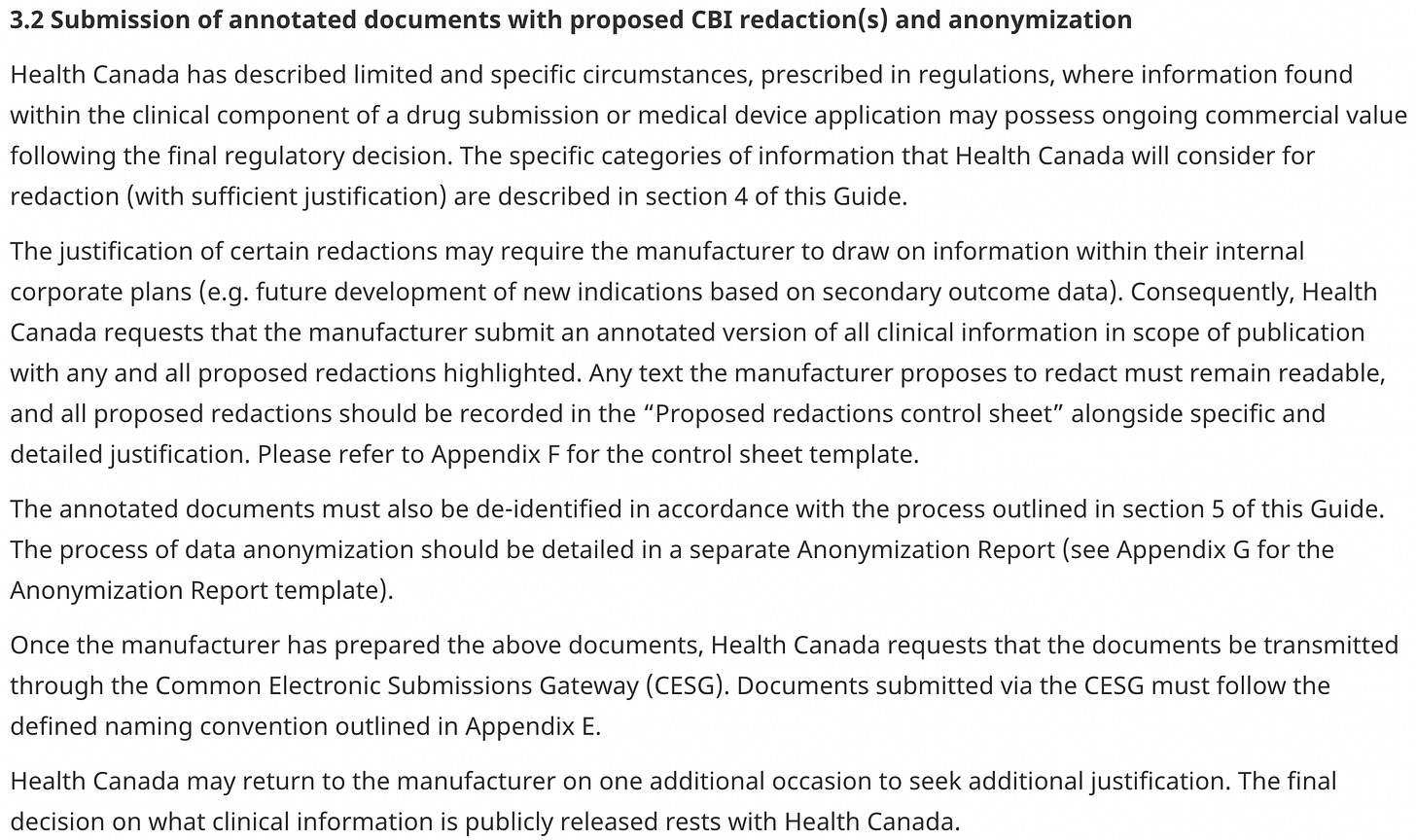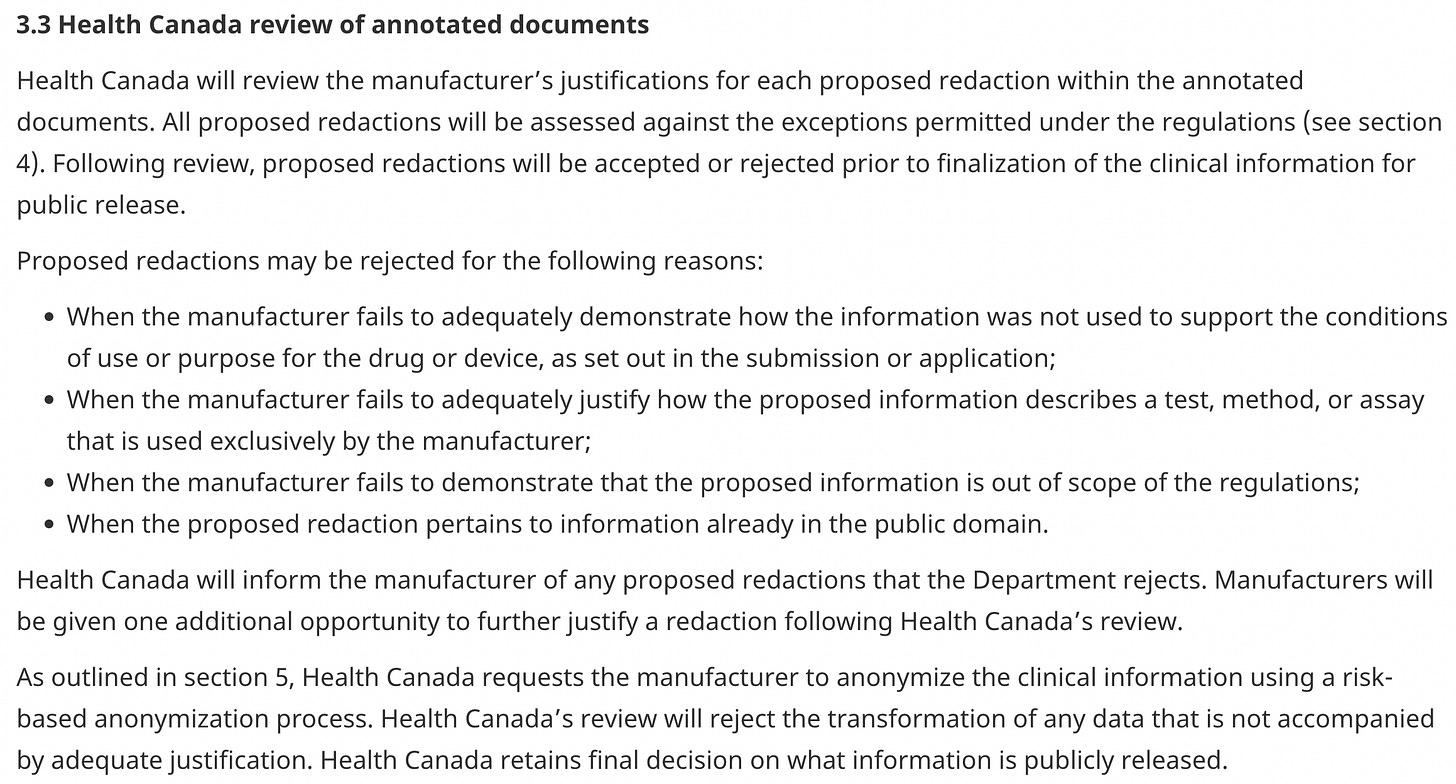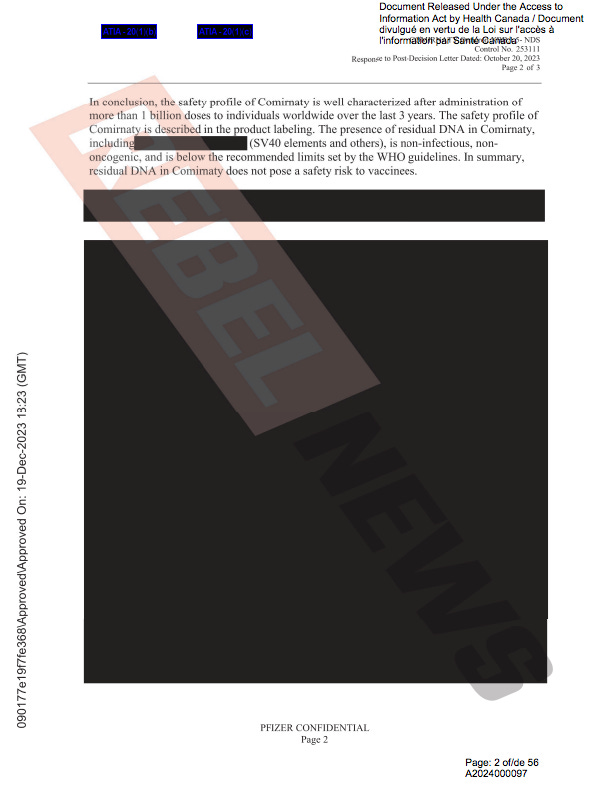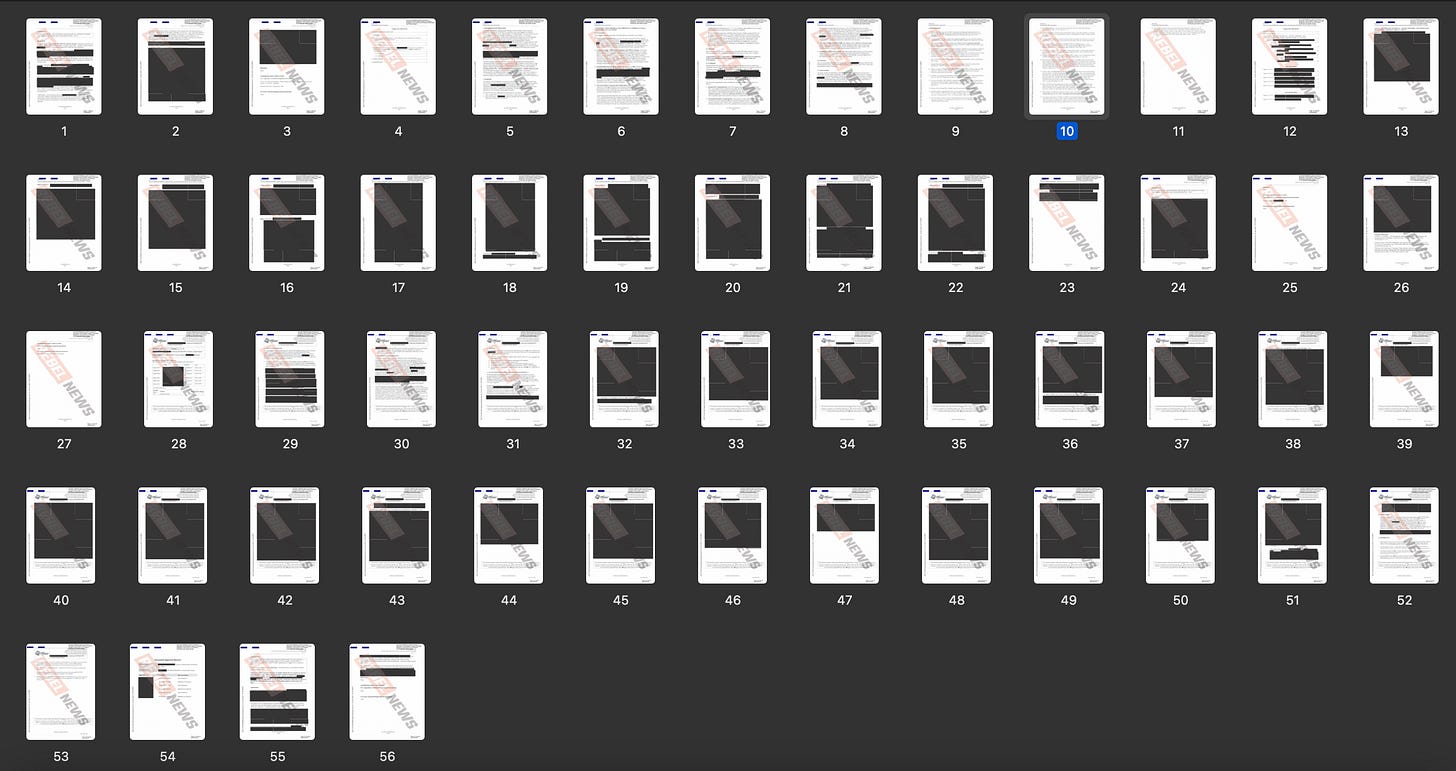Access to information means ACCESS TO INFORMATION
Redactions of CBI data can be over-riden if in the public interest to do so
Canada’s freedom of information request system is called an Access to Information Act (ATIA) and has been used many times since 2021 in an attempt to get answers to questions pertaining to the COVID-19 injectable products and their safety and efficacy profiles. There are two main reasons information can be redacted once ATIAed: it relates to businesses or is personal.
Confidential Business Information (CBI): This refers to sensitive business information that is not publicly available, such as trade secrets, financial data, or other confidential commercial information. CBI is redacted to protect the business interests of companies and organizations.
Personal Information: This refers to information about an individual, such as their name, address, social insurance number, or other personal details. Personal information is redacted to protect the privacy of individuals and prevent identity theft or other harm.
The latter I get; the former is questionable under certain circumstances. The reason it is questionable - and mutable for that matter - is because it can be the case that the redaction of data is not in the public interest, and when dealing with drugs or prodrugs deployed on a large majority of the population, this certainly does concern the public. It is important to know that redactions can be challenged and over-turned as well.
In Canada, under the ATIA, CBI can generally be redacted to protect the commercial interests of third parties, like Pfizer. However, there are situations where it might not be acceptable or where redaction might be challenged:
Public Interest Override: Section 20(6) of the ATIA allows the head of an institution to disclose third-party information if the public interest in disclosure clearly outweighs any invasion of privacy or commercial confidentiality. This might apply in situations involving significant public health, safety, or environmental issues where the public interest in the information is paramount.
Mandatory Disclosure: Information must be disclosed if it falls under mandatory disclosure provisions, like information about environmental impact or product safety that is compelled by other legislation or regulations.
Information Already in the Public Domain: If the CBI has already been disclosed by the third party or is otherwise publicly available, redaction might not be upheld. This could occur if the information was legally released or if it became public through other means.
Judicial Review or Information Commissioner's Decision: If an individual or the Information Commissioner of Canada challenges the redaction and it is determined through review or legal proceedings that the redaction was not appropriate, the information might have to be released. This could happen if the exemption was applied too broadly or incorrectly.12
CBI redactions have to be based on a balance between protecting commercial interests of business and the principles of transparency and accountability and decisions to redact should be justified under the specific exemptions of the Act. The possibility for review by the Information Commissioner or through judicial processes is always clear and present if the redaction is contested.
I could go page-by-page through this latest ATIA (thank you to Scoops McGoo and Tamara Ugolini) that assures it’s fine that the undisclosed SV40 promoter/enhancer sequence is in the COVID-19 modRNA coding material and that DNA is non-infectious, non-oncogenic and is below the recommended limits set by the WHO3, but I’d rather focus on getting some of these documents un-redacted so we can actually read them and make an informed decision that is actually in the best interest of the public.
I am even naive enough to believe that there are employees at Health Canada who truly want the absolute best for Canadians and would support un-redacting some of these documents. This would not necessarily have to violate any CBI. For example, I would expect that an executive summary would be un-redactable as it not detail-oriented, being a summary. Test results are also non-proprietary and should not have to be redacted. The only reason I can think of to redact a test result is in the case of non-compliance with accepted standards.
As stated in the above a redaction is not justified in situations involving significant public health, safety, or environmental issues where the public interest in the information is paramount. THIS IS ABSOLUTELY THE CASE HERE.
Health Canada has the final say as to whether information remains redacted. Section 3.2 under Procedures heading 3 states:


I would claim that the manufacturer (Pfizer in this case) failed to adequately demonstrate how the SV40 promoter/enhancer supported conditions of use for the COVID-19 modRNA products as set out in the application. By the way, this information is indeed in the public domain as indicated in the peer-reviewed literature.

If there is no actual threat to public health, then excellent: nothing ventured, nothing gained. It can be settled. But redacting/hiding data, test results and obscuring answers to questions that truly involve everyone is NOT acceptable for any reason, and this is in accordance with the Public Release of Clinical Information - Draft Guidance Document. It also makes the people in charge of redaction look quite… dodgy.
Health Canada, I implore you to please put the health of Canadians first and consider un-redacting this, and other documents, in the interest of public safety and health with respect to Public Interest Override. If what you claim is true: that there are no significant public health, safety or environmental issues, then we’re all good.
But the onus is on you to prove these things in the face of new data - the onus is not on the public to prove harm.
Just so that you, the reader, get an idea of the degree of final redaction of this particular ATIA request “to provide additional data and/or information characterizing the size distribution of residual DNA fragments and residual circular plasmid by Dec 1, 2023”, here is the document in pdf format followed by a screenshot of all of the pages in the response to the Post-Decision letter Dated October 20, 2023; A2024000097, Control No. 253111.
Kevin McKernan has published a thorough analysis of this latest ATIA that you can read below that addresses the fact that the articles used to back-up claims of SV40 being “okey dokey” actually contradict this claim, and I would guess that this might be due to the fact that they didn’t read and/or understand the papers.
Kevin’s article addresses the part of freedom of information request that was not redacted, but even more important, are the parts that are. We simply need to be able to read what was written.
Scoops McGoo originally wrote this up on August 28, 2024.
https://www.canada.ca/en/health-canada/programs/consultation-public-release-clinical-information-drug-submissions-medical-device-applications/draft-guidance.html#a3-2
https://www.canada.ca/en/treasury-board-secretariat/services/access-information-privacy/access-information/access-information-manual.html#cha13
https://mega.nz/file/tBoUjZgC#61bsUzYSb9tmnJDnblocwLTgGiRf1InViZwxPJfHnXw






